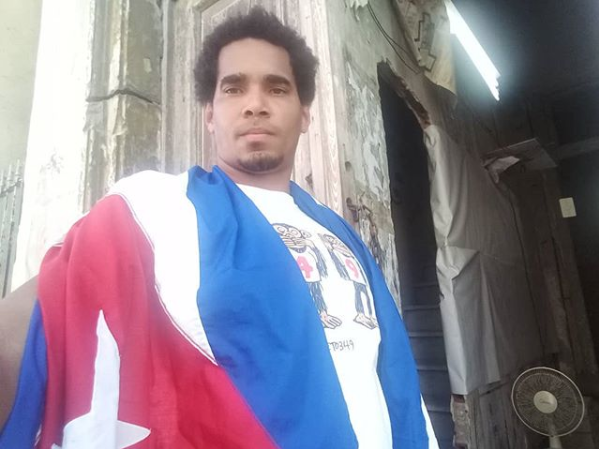Politics
After an International Outcry, Cuban Performance Artist Luis Manuel Otero Alcantara Has Been Released From Jail
But the artist's legal woes aren't over yet.

But the artist's legal woes aren't over yet.

Taylor Dafoe

After spending nearly two weeks in jail, Cuban performance artist Luis Manuel Otero Alcantara has been released from following an outcry from artists and international rights groups.
Otero Alcántara, who is 32, was arrested outside his home in Havana on March 1, on his way to join an LGTBIQ rally. According to his partner, fellow activist Claudia Genluie, he spent 13 days in “preventive prison” awaiting trial for various charges, including the “desecration of patriotic symbols”—an allegation relating to his 2019 performance #LaBanderaEsDeTodos, which saw the artist wearing the Cuban flag for a month straight.
The artist was also charged with alleged property damage for an incident that occurred last year after he was arrested at an anti-censorship protest. Otero Alcántara says he kicked the inside of a police car while police assaulted Genluie for refusing to turn over her phone.
Still, the fight isn’t over for the artist. The state has not dropped the charges and his trial date is pending. If convicted, he could face between two and five years in prison.
“Otero Alcántara’s release prior to trial is entirely just,” says artist and activist Coco Fusco, who has been vocal in her support for the artist. “The state released him to stop the escalating protests and the international outcry.”
Indeed, the artist’s arrest incited a furor among artists both in Cuba and worldwide, many of whom speculated that the charges were trumped up to punish him for speaking out against the state. More than 3,300 people signed a petition started by Fusco that demands Otero Alcántara’s release. The level of support the petition has received is a sign to Fusco “that Cubans inside the country are losing their fear of speaking out.”
“The situation is embarrassing for the Cuban government,” Fusco says. “Otero Alcántara’s has received support from a broad spectrum of cultural figures inside Cuba—that is a very rare example of solidarity and public expression of dissent from the state’s position.”
Otero Alcántara has been detained by authorities more than 20 times in the last three years. Roughly half of those arrests came in the past year, as Cuban authorities have cracked down on their enforcement of Decree 349, a law passed in 2018 that prevents artists from showing their work without approval by the ministry of culture.
Last week, Amnesty International publicly called for Otero Alcantara’s release, referring to him as a “prisoner of conscience.”
“It is absolutely shameful that the Cuban administration continues to stifle any voices that are not aligned with the official position,” said Erika Guevara-Rosas, director of the Americas at Amnesty International, in a statement.
“They couldn’t take from me my rights or my liberty,” said Otero Alcantara in an Instagram video that he posted upon his release last Friday. The artist thanked the thousands of people who spoke out against his arrest online, before closing with a promise: “We are going to keep producing art; it’s the biggest responsibility of our lives. We will keep fighting for a free Cuba.”